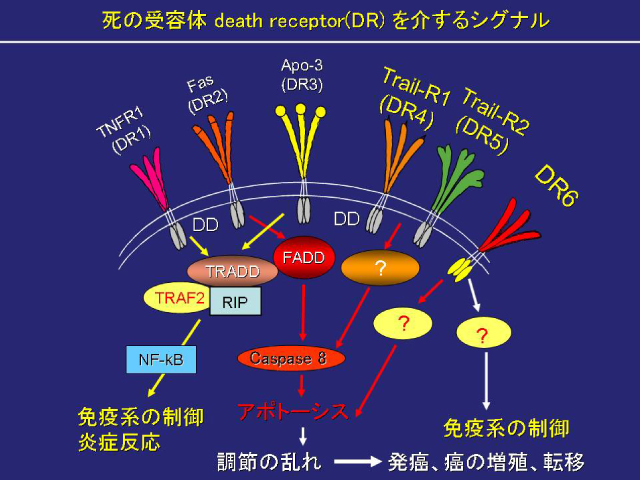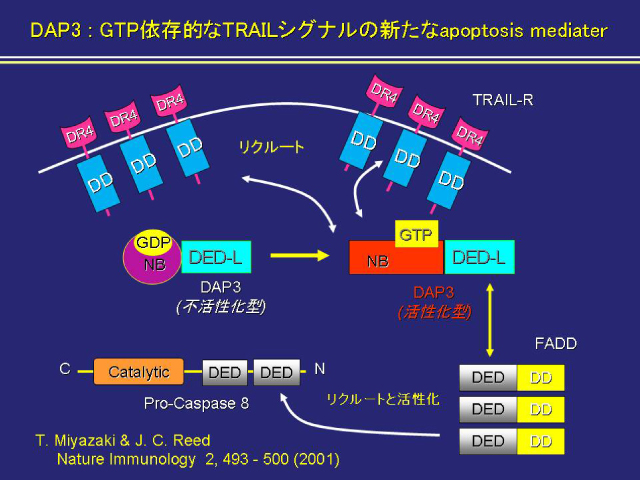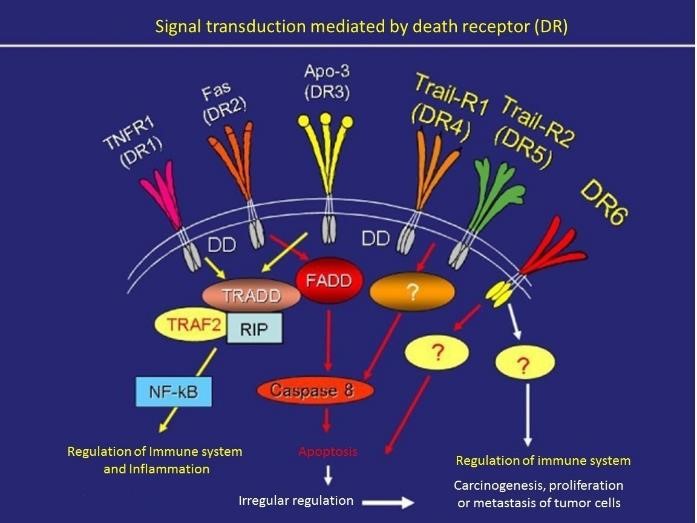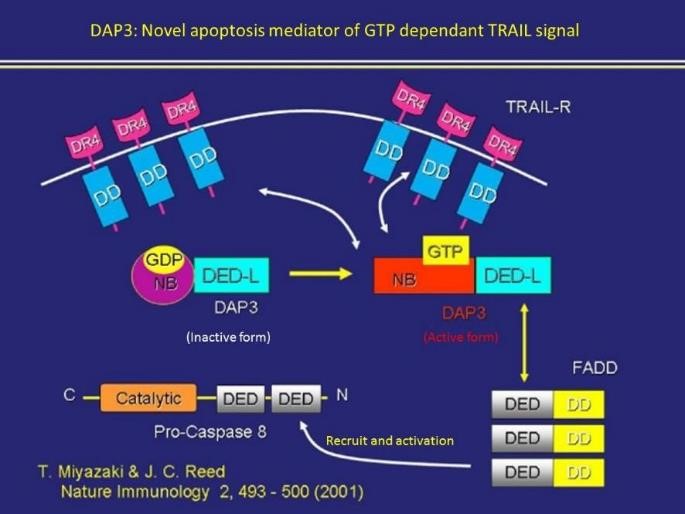アポトーシス誘導機構の解明MECHANISM FOR THE INDUCTION OF APOPTOSIS AND ANOIKIS
 TNFファミリー分子の一つであるTRAIL(TNF related apoptosis-inducing ligand)は癌細胞にアポトーシスを誘導しますが、正常細胞には作用を示さない事が知られ、副作用のない癌治療への応用が期待されているサイトカインです。
TNFファミリー分子の一つであるTRAIL(TNF related apoptosis-inducing ligand)は癌細胞にアポトーシスを誘導しますが、正常細胞には作用を示さない事が知られ、副作用のない癌治療への応用が期待されているサイトカインです。
 これまでにDAP3(death associated protein 3)がdeath receptorのリガンドの一つであるTRAILのアポトーシス誘導シグナルを伝達する事を発見しました。また、DAP3が細胞接着喪失によるアポトーシス(Anoikis)のシグナル伝達経路にも重要である事を見出しました。細胞接着と癌転移には密接な関係があり、Anoikisを起こさない癌細胞は容易に転移を起こす性質があります。
これまでにDAP3(death associated protein 3)がdeath receptorのリガンドの一つであるTRAILのアポトーシス誘導シグナルを伝達する事を発見しました。また、DAP3が細胞接着喪失によるアポトーシス(Anoikis)のシグナル伝達経路にも重要である事を見出しました。細胞接着と癌転移には密接な関係があり、Anoikisを起こさない癌細胞は容易に転移を起こす性質があります。
つまり癌細胞特異的にアポトーシスを誘導するサイトカインのシグナル伝達経路に関与するだけでなく、癌の転移抑制による悪性化阻止にもDAP3は関与していると考えられます。
 TRAIL(TNF Related Apoptosis-Inducing Ligand)is one of the TNF family of molecules which induces apoptosis in cancer cells. TRAIL is a cytokine, and it is known that TRAIL does not operate against healthy cells. It is therefore expected that its use in the treatment of cancer will have no side effects.
TRAIL(TNF Related Apoptosis-Inducing Ligand)is one of the TNF family of molecules which induces apoptosis in cancer cells. TRAIL is a cytokine, and it is known that TRAIL does not operate against healthy cells. It is therefore expected that its use in the treatment of cancer will have no side effects.
 We have demonstrated that TRAIL can induce apoptosis through the activation of the death receptor ligand, DAP3 (Death-Associated Protein 3). In addition, we have discovered that DAP3 is important to the apoptosis (anoikis) signal transmission route, through the loss of cellular adhesion. There is a strong correlation between cellular adhesion and cancer transition. Cancer cells that do not cause anoikis have the capacity to easily cause metastasis.
We have demonstrated that TRAIL can induce apoptosis through the activation of the death receptor ligand, DAP3 (Death-Associated Protein 3). In addition, we have discovered that DAP3 is important to the apoptosis (anoikis) signal transmission route, through the loss of cellular adhesion. There is a strong correlation between cellular adhesion and cancer transition. Cancer cells that do not cause anoikis have the capacity to easily cause metastasis.
In conclusion, we consider that DAP3 is not only related to the apoptosis inducing cytokine signal transmission route for cancer cells, but importantly it is also a metastasis suppressor for cancer cells, but importantly it is also a metastasis suppressor for cancer and therefore acts to prevent malignant growth.

